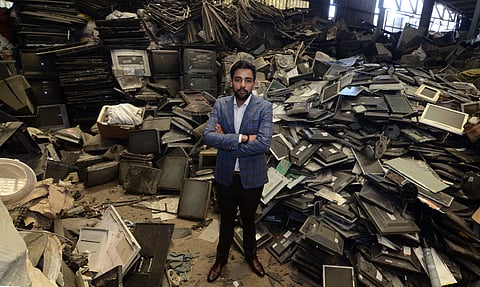

Be it Oppo, Vivo, Mi, Samsung or Apple, each phone's tech upgrade is as enticing as the previous one. And we end up buying one almost every year — an online study showed 40 per cent Indians want to change their phones every year. But what happens to the old model? You need to keep track of that, says Akshay Jain of Namo eWaste Management. Akshay has been responsibly discarding and recycling electronic waste since 2015.
What's in a phone, anyway?
The world is worried about pollution from vehicles and carbon emissions but not many talk about the harmful effects of elements like Mercury, Lead or Sulphur that e-waste produces. While pursuing his MBA in Greenwich University, London, Akshay visited a scrap facility and what he saw shocked him. "They had tons of e-waste and had no solution for it. I came back to India and tried to work that out in the Indian perspective. My family was already into the scrap business. I started researching and it took me almost two years to come up with a feasible plan," says Akshay.
Tricks of The Trade: Akshay and his team checks the electronic item and segregate it into repairable and irreparable assets (Pic: Naveen Kumar/Express)
Mercurial trouble in every tring
The 30-year-old engineer from Faridabad feels that people need to know more about how harmful their electronic waste can be. "People need to understand that Mercury, Lead, Sulphur and Arsenic emissions are way more toxic than automobile pollution," says Akshay, as he explains the process of recycling electronic items. "We check the electronic item and segregate it into repairable and irreparable assets. The irreparable ones are then sent for dismantling — we segregate it into different materials, like plastic, metal and precious metal. Then comes the last process — recycling. Shredding, electrolysis, separation and other non-hazardous methods of segregation are part of this process. The harmful substances are taken out during recycling and sent to government-approved dumping sites where they are incinerated," he adds.
Clean it like you mean it
Akshay and his team also conduct community awareness and collection drives letting people know about the harmful effects of just disposing of their phone or laptop. "We collaborate with social service groups. They take care of the aspect of letting people know that something like this is happening. It is not possible to conduct door-to-door collection. So we encourage people during our awareness sessions to give us electronics that they would like to get rid of. Even if we have not been to a particular area, we can pick-up your old electronics if you inform us," adds Akshay.
Akshay tells us about the three Rs of recycling — Reduce, Reuse and Recycle. "If the producers can reduce the number of toxic elements used during the making of the product that will be a major change. Coming to consumers, you can only ask them to use the devices longer and not discard their phones every six months. When they do dump it, they should know that it has to be sent to a proper recycler and not just thrown in the dustbin. You should be held for accountable for your waste," he concludes.
